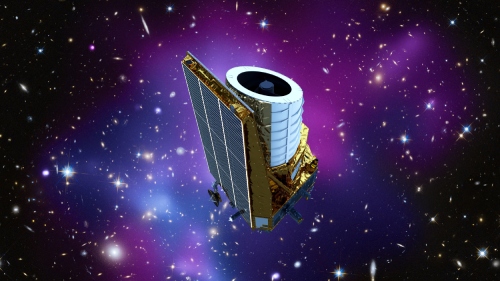
A Spacecraft That Hunts For Dark Matter Is About To Launch In Europe
As scientists get ready for the launch of the Euclid spacecraft from the European Space Agency (ESA), a dark matter-hunting telescope that researchers hope will soon shed some light on one of the universe’s more mysterious aspects, excitement is running high in Europe.
Dim energy and dim matter are fundamental for how we might interpret the universe. Dark matter, which is thought to make up a whopping 80% of the mass of the universe, is a tethering force that keeps the cosmos organized and intact, according to the prevalent theory. Dark energy is the force behind the acceleration of the expansion of the universe.
Additionally, dark matter does not produce any light or energy, and conventional sensors are unable to detect it, making it extremely elusive to scientists. Because of this, Euclid is made to make a detailed map of the universe in order to infer its properties indirectly.
Professor Andy Taylor, an astrophysicist at Edinburgh University, stated to The Guardian, “If the nature of these dark components remains a mystery, we cannot say we understand the universe.” Euclid’s significance is due to this.”
However, Euclid’s excitement stems not only from the mission’s nature but also from the fact that it is taking place at all.
The craft, which cost about $850 million, was supposed to launch last year on a Russian Soyuz rocket, according to The Guardian. However, before Euclid could be launched, Roscosmos, the Russian space agency, and the European Space Agency severed their cooperation.
Euclid will now launch on one of SpaceX’s Falcon 9 rockets on July 1, after a long wait.
The ground-based researchers are hoping that the telescope’s ability to track how galaxy clusters and other celestial objects cause light to curve on its way to Earth will provide them with a one-of-a-kind insight into dark matter’s workings.
“Euclid has the settling force of the Hubble space telescope yet will actually want to study 33% of the night sky simultaneously,” Stephen Wilkins, a Sussex College stargazer, told The Gatekeeper, “so it will provide us with a staggeringly definite guide of the sky.”
Taylor added, “The point of Euclid is really to get the data that will allow us to start distinguishing between which of the various ideas we have about the dark universe.” We can only hope that will help us comprehend the fundamental nature of what is occurring in the universe around us.
Disclaimer: The views, suggestions, and opinions expressed here are the sole responsibility of the experts. No Research Raptor journalist was involved in the writing and production of this article.